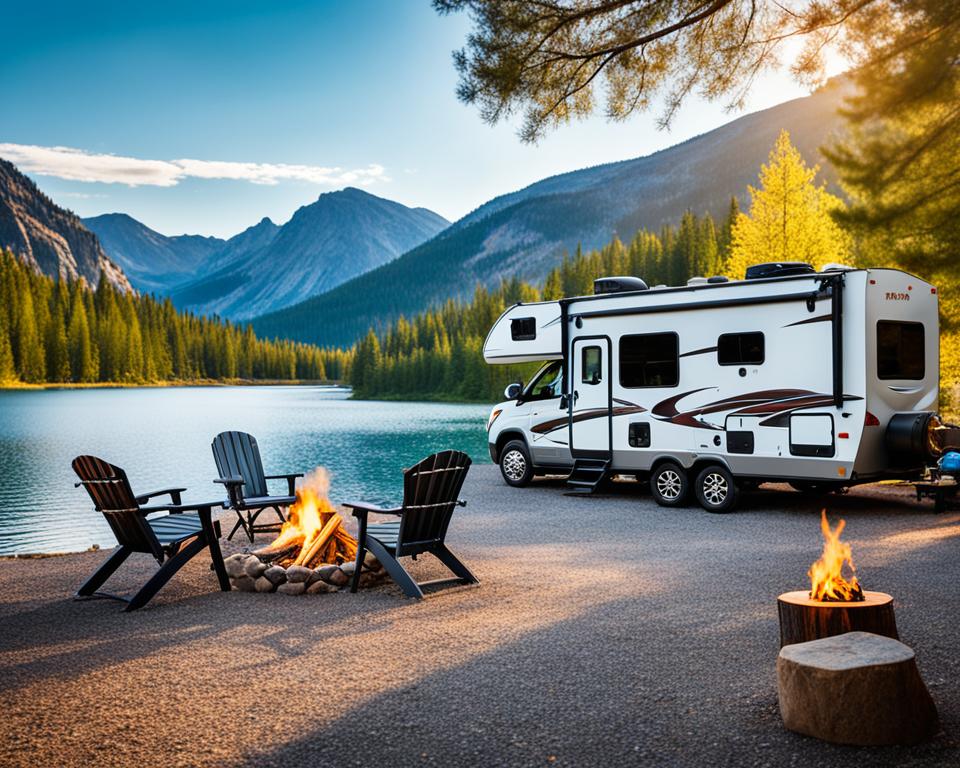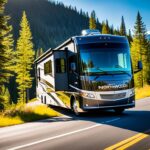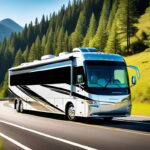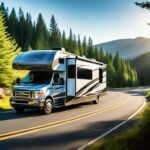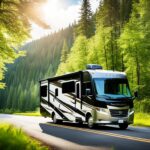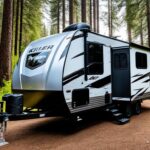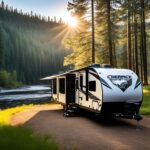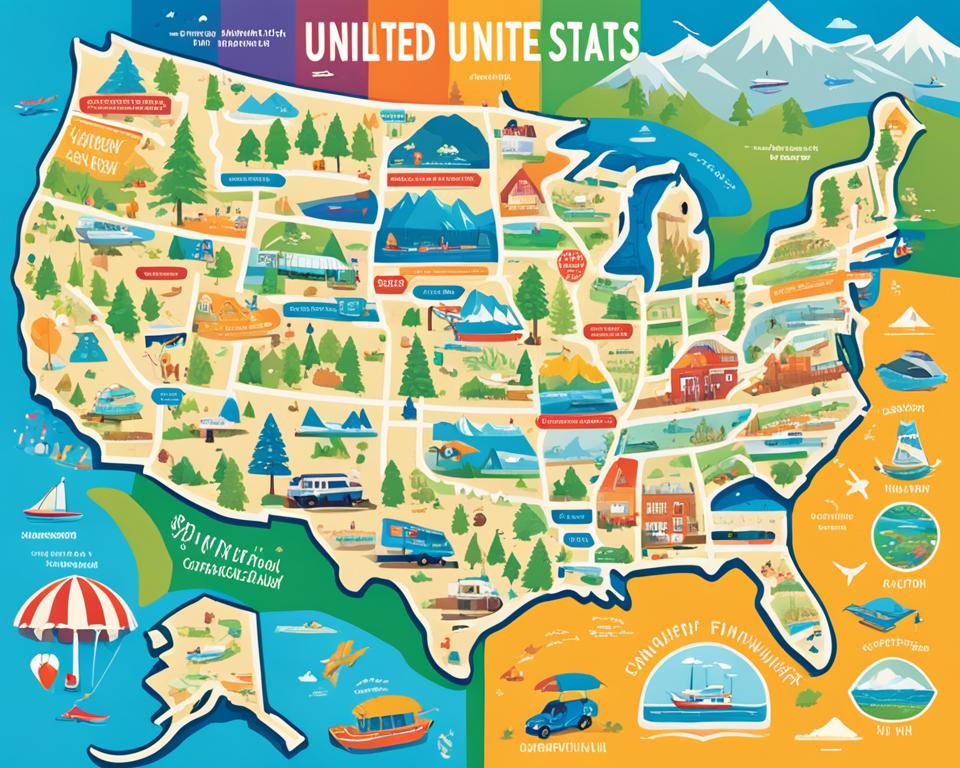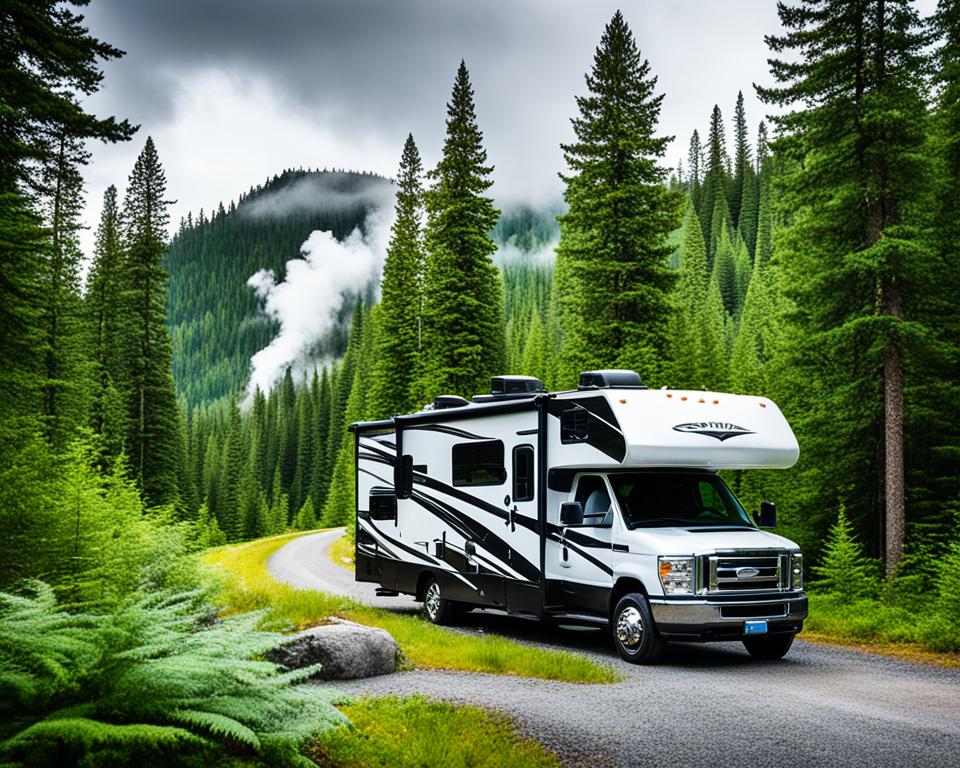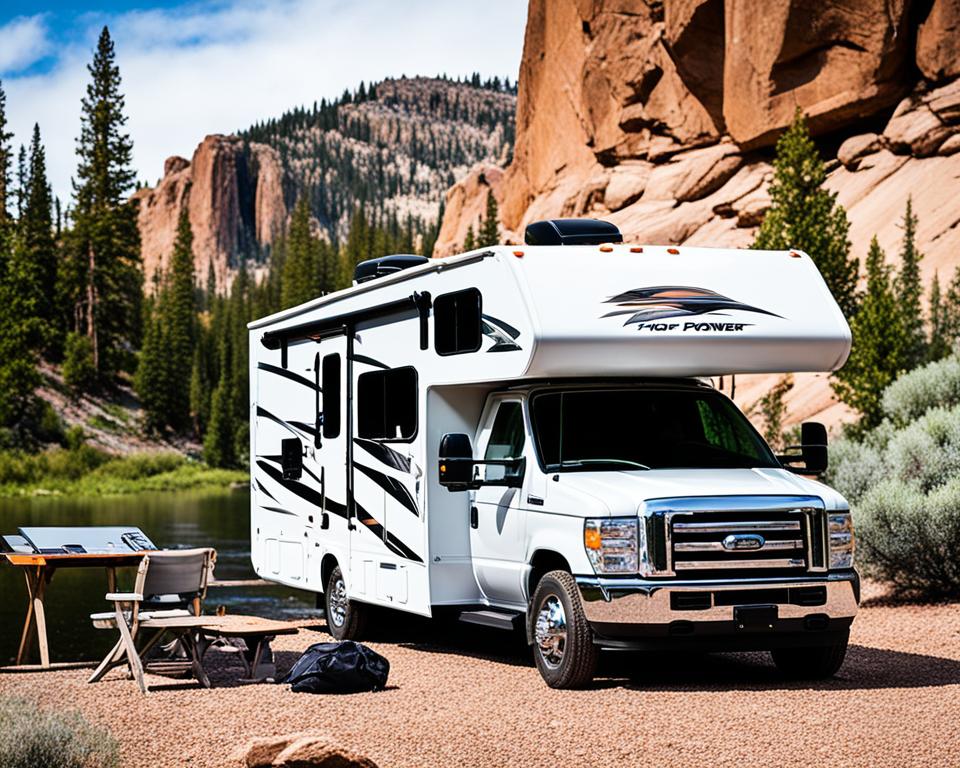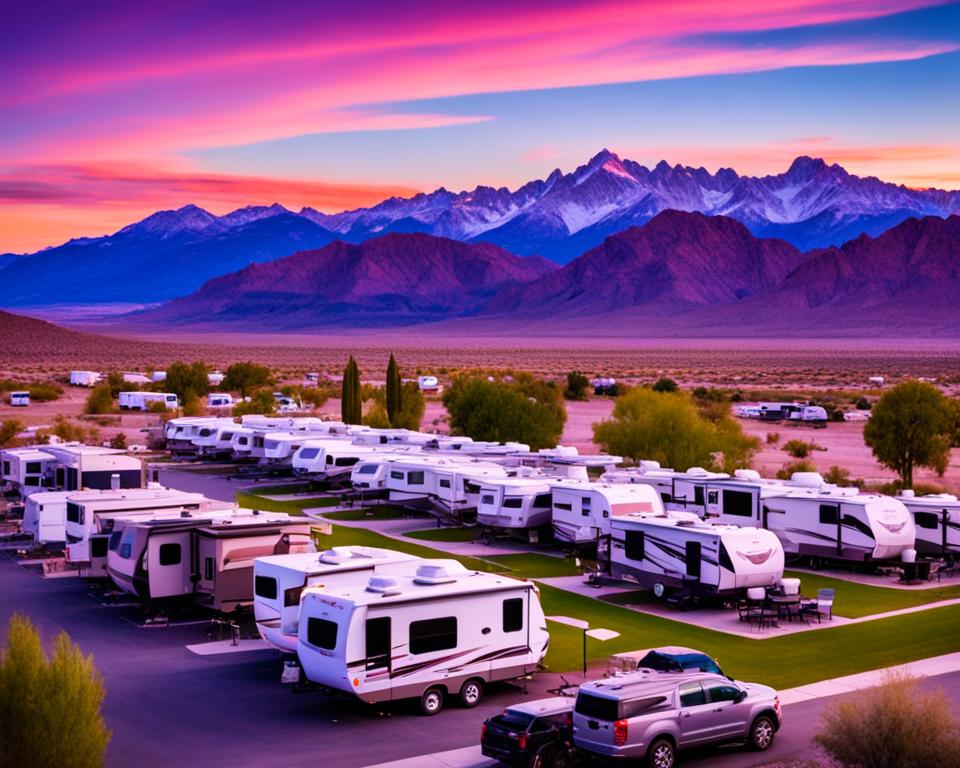RV camping is a popular outdoor activity that offers a unique and exciting way to explore the great outdoors. Whether you’re a new RVer or considering embarking on your first RV adventure, it’s important to be prepared and informed. In this comprehensive guide, we will provide you with essential tips and tricks to ensure a successful and enjoyable RV camping experience.
Key Takeaways:
- RV camping is a fantastic way for beginners to embark on an outdoor adventure.
- Proper planning and preparation are key to a successful RV camping trip.
- Understanding the different types of RVs and their features can help you choose the right one for your needs.
- Knowing your vehicle’s towing capacity is essential before selecting an RV to prevent any issues on the road.
- Finding suitable parking spaces for your RV requires planning and consideration, especially for larger vehicles.
Learn the Different Types of RVs
Before embarking on an RV camping trip, it is important to familiarize yourself with the different types of RVs available. This knowledge will help you make informed decisions when booking RV campsites and choosing the right RV for your needs.
Motorized RVs
Motorized RVs are self-propelled vehicles that provide both transportation and living space. They offer convenience and flexibility on the road. Here are the main types of motorized RVs:
- Class A Motorhomes: These are the largest and most luxurious RVs, often resembling a bus. They provide spacious interiors and a wide range of amenities, making them ideal for long trips.
- Class B Motorhomes: Also known as camper vans, these compact vehicles are easy to maneuver and park. They are a great choice for solo travelers or couples looking for a versatile and fuel-efficient option.
- Class C Motorhomes: These RVs feature a distinctive cab-over design and offer a good balance between the space of a Class A motorhome and the convenience of a Class B motorhome. They are popular among families and small groups.
- Converted Camper Vans: These are regular vans that have been converted into campers. They are a budget-friendly option and provide a cozy and compact living space.
Towable RVs
Towable RVs are trailers that require another vehicle, such as a truck or SUV, to tow them. They come in various sizes and styles. Here are the main types of towable RVs:
- 5th Wheel Campers: These RVs have a raised forward section and require a special hitch installed in the bed of a pickup truck. They offer spacious living areas and are popular among long-term campers.
- Travel Trailers: These RVs come in a wide range of sizes and floor plans, making them suitable for different needs and budgets. They are versatile and easy to tow.
- Truck Campers: These RVs are designed to fit in the bed of a pickup truck. They offer compact living space and are ideal for off-road camping or shorter trips.
- Teardrop Campers: These small and lightweight trailers feature a distinctive teardrop shape. They provide basic amenities and are perfect for solo travelers or couples seeking simplicity.
- Pop-Up Campers: Also known as tent trailers, these RVs have collapsible walls and roofs, making them compact during transport and spacious when set up. They offer a balance between tent camping and RVing.
- Toy Haulers: These RVs have a separate garage area at the rear, allowing you to bring along small vehicles, such as motorcycles or ATVs. They are popular among outdoor enthusiasts.
Understanding the different types of RVs and their features will help you choose the right RV style for your camping adventure. Whether you opt for a motorized RV or a towable RV, each type has its unique advantages and considerations. Take your time to research and find the perfect RV that suits your preferences, needs, and budget.
Confirm How Much Your Vehicle Can Tow
Before embarking on an RV adventure, it’s crucial to know your vehicle’s towing capacity. This will ensure that you select an RV that can be safely towed by your vehicle. You don’t want to find yourself in a situation where your vehicle struggles to tow the RV or exceeds its towing limits. By understanding your vehicle’s towing capacity, you can have peace of mind and avoid any towing issues on the road.
When calculating towing capacity, it’s important to consider not only the weight of the RV but also the weight of your gear and supplies. Factor in the total weight that your vehicle can safely tow, including passengers and cargo. This will help you make an informed decision and choose an RV that suits your needs without compromising safety.
Knowing your vehicle’s towing capacity is particularly crucial because exceeding it can lead to dangerous situations such as difficulty maneuvering, reduced braking power, and even engine damage. By staying within your vehicle’s towing capacity, you can maintain optimal control and performance while on the road.
If you are unsure of your vehicle’s towing capacity, you can consult your vehicle’s owner’s manual or contact the manufacturer directly. They will provide you with the necessary information to make informed decisions about RV towing.
Remember: Your vehicle’s towing capacity is a vital consideration when choosing an RV. Stay safe on the road by confirming your vehicle’s capacity and selecting an RV that falls within that range.
| Vehicle Make | Vehicle Model | Towing Capacity |
|---|---|---|
| Ford | F-150 | 12,000 lbs |
| Chevrolet | Silverado 1500 | 11,500 lbs |
| Toyota | Tundra | 10,200 lbs |
| Dodge | Ram 1500 | 10,200 lbs |
Know Where to Best Park Your RV
Finding suitable parking for your RV can be challenging, especially when stopping by malls, markets, or restaurants. It is important to plan your RV camping trip in advance and map out a route that includes truck-friendly rest stops where you can find sufficient parking spaces for your RV. Smaller motorhomes and converted vans may have more flexibility in finding parking spaces, but larger RVs require more planning and consideration.
RV Parking Tips:
- Prioritize truck-friendly rest stops: Look for rest stops that specifically mention RV parking or accommodate large vehicles.
- Research RV-friendly businesses: Before heading to a mall or market, check if they have designated RV parking spaces or allow overnight parking.
- Utilize smartphone apps: Download apps like RV Parky, iExit, or AllStays that provide information about RV-friendly parking options along your route.
- Plan for ample space: When parking at a rest stop or other location, ensure that there is enough space for your RV and any slide-outs or awnings.
- Be mindful of time limits: Some parking areas may have time restrictions, so be aware of any limitations to avoid any fines or towing.
- Consider off-peak hours: If visiting popular tourist attractions or restaurants, try to arrive during off-peak hours to find parking more easily.
By following these RV parking tips and planning ahead, you can ensure a stress-free experience when it comes to finding suitable parking for your RV.
| Pros | Cons |
|---|---|
| Availability of truck-friendly rest stops | Limited parking options in busy areas |
| Flexibility for smaller motorhomes and converted vans | Need for more planning and consideration for larger RVs |
| Convenient smartphone apps for RV-friendly parking | Possible time limits and restrictions |
| Parking options at RV-friendly businesses | Need to be mindful of peak hours |
| Opportunity to arrive during off-peak hours |
Map Out a Realistic RVing Budget
RVing can be a cost-effective alternative to traditional vacations, but it is important to plan your budget accordingly. Consider expenses such as fuel costs, campground fees, rental fees, insurance, amenities, repairs, and standard living expenses. By mapping out a realistic RVing budget, you can ensure that you have enough funds for a comfortable and enjoyable trip.
When creating your RV road trip budget, it’s essential to account for all potential expenses. Start by estimating your average fuel consumption based on the distance you plan to travel and the fuel efficiency of your RV. Fuel costs can add up significantly, so it’s crucial to have a clear understanding of your expected mileage and plan accordingly.
Next, consider campground fees. Prices can vary depending on location, amenities, and time of year. Research different campgrounds along your route and determine their nightly or weekly rates. Don’t forget to factor in any additional charges, such as fees for extra guests or pets.
Rental fees can also contribute to your overall RVing expenses. If you don’t own an RV and plan to rent one for your trip, consider the daily rental cost as part of your budgeting process. Be sure to compare prices from different rental companies and check for any hidden fees or deposit requirements.
Insurance is another crucial component of your RV road trip budget. Make sure you have adequate coverage for your vehicle and any belongings inside. Contact your insurance provider or shop around for the best rates and coverage options.
Additionally, it’s important to factor in the cost of amenities. Some campgrounds may charge extra for amenities such as Wi-Fi, laundry facilities, or swimming pools. Determine which amenities are essential to you and include those costs in your budget.
Repairs and maintenance are inevitable expenses when RVing. It’s a good idea to set aside some funds for unexpected repairs or regular maintenance services. Keeping your RV in good condition will ensure a smooth and hassle-free trip.
Lastly, don’t forget to budget for standard living expenses such as groceries, dining out, and entertainment. Plan your meals and snacks in advance to avoid unnecessary expenses and consider cooking your meals in your RV to save money.
By thoroughly mapping out your RVing budget and considering all potential expenses, you can embark on your RV road trip with confidence, knowing that you have enough funds to cover your journey’s costs.
Find RV Campgrounds and RV Parks That Won’t Break the Budget
When planning an RV camping trip, one of the key considerations is finding affordable campgrounds and parks that fit your budget. Campsite costs can vary greatly depending on the location and season, but with some research and smart choices, you can enjoy your trip without breaking the bank.
To find affordable RV campgrounds, consider investing in RV park memberships. These memberships often provide access to a network of campgrounds and offer discounted rates for members. Some popular RV park memberships include Passport America, Thousand Trails, Good Sam, and Harvest Hosts. With these memberships, you can save money on campsite fees and enjoy the benefits of being part of a community of RV enthusiasts.
Another option to consider is staying at RV park chains. These chains often have multiple locations across the country, allowing you to travel without worrying about high campsite costs. Sun RV Resorts is one such chain that offers affordable and comfortable campsites in various destinations.
For those looking to minimize camping expenses, free campsites are a great option. Many public lands, such as those managed by the Bureau of Land Management (BLM), offer free camping opportunities. These sites often provide basic amenities such as picnic tables and fire rings, allowing you to enjoy nature without spending a dime. Just make sure to follow any rules or restrictions in place.
Additionally, taking advantage of weekly and monthly discounts can significantly reduce your camping expenses. Many RV parks offer discounted rates for longer stays, making it more affordable to enjoy an extended vacation or explore an area at a leisurely pace.
Lastly, consider boondocking or dry camping as a cost-saving option. Boondocking refers to camping in remote areas without hookups or amenities. While this may require self-sufficiency in terms of water and electricity, it allows you to experience off-the-grid camping and save on campsite fees.
RV Campgrounds and Parks Comparison Table
| RV Park | Membership Fee | Discounts | Locations | Website |
|---|---|---|---|---|
| Passport America | $44/year | 50% off participating campgrounds | Nationwide | passport-america.com |
| Thousand Trails | Varies based on membership level | Free or discounted stays at participating campgrounds | Multiple locations across the U.S. | thousandtrails.com |
| Good Sam | $29/year | 10% discount at participating campgrounds | Nationwide | goodsam.com |
| Harvest Hosts | $99/year | Free overnight stays at wineries, farms, and attractions | Multiple locations across the U.S. and Canada | harvesthosts.com |
| Sun RV Resorts | Varies based on location | Varies based on location | Multiple locations across the U.S. | sunrvresorts.com |
Note: Membership fees and discounts are subject to change. Please check the respective websites for the most up-to-date information.
By exploring these options and planning ahead, you can find affordable RV campgrounds and parks that suit your budget. Whether you choose a membership, take advantage of discounts, or opt for free or low-cost camping, there are plenty of opportunities to enjoy the RV lifestyle without breaking the bank.
Choose the Right RV Campsites for Your Needs
Choosing the right RV campsites is crucial for a successful trip. When selecting a campground, it’s important to consider the amenities they offer to ensure a comfortable stay. Take a look at the key factors to consider when choosing an RV campsite:
RV Campsite Amenities
One of the first things to look for is the availability of RV campsite amenities. These can include:
- Electric hookups: Check if the campsite provides electrical hookups for your RV, especially if you rely on electricity for various appliances.
- Water hookups: Ensure that the campsite has water hookups so you can easily access freshwater for drinking, cooking, and showering.
- Septic hookups: If your RV has a septic system, make sure the campsite offers septic hookups for convenient waste disposal.
Additional Considerations
Depending on your RV’s features and your personal preferences, you may want to take into account other amenities such as:
- Bathrooms and showers: If your RV doesn’t have a shower or if you prefer to use a larger shower facility, confirm that the campsite provides clean and accessible bathrooms and showers.
- Laundry facilities: Check if the campsite has laundry facilities available for your convenience.
- Recreational activities: If you enjoy recreational activities during your camping trip, look for campgrounds that offer amenities such as swimming pools, hiking trails, playgrounds, or sports courts.
Reservations
Once you have identified potential RV campsites that meet your criteria, it’s advisable to make campground reservations. Many popular campgrounds get fully booked, especially during peak travel seasons or for specific events, so securing your reservation in advance ensures you have a spot reserved for your vehicle.
| Campground Name | Location | Amenities | Reservation Info |
|---|---|---|---|
| Happy Trails RV Park | Colorado Springs, CO | Electric hookups, water hookups, bathrooms, showers, laundry facilities, swimming pool | Reservations can be made online or by phone |
| Nature’s Haven Campground | Asheville, NC | Electric hookups, water hookups, bathrooms, showers, hiking trails, playground | Reservations can be made online or by email |
| Coastal Breeze RV Resort | Destin, FL | Electric hookups, water hookups, bathrooms, showers, swimming pool, pet-friendly | Reservations can be made online or on site |
Take the time to research and choose RV campsites that align with your needs and preferences. By considering the available amenities and making reservations in advance, you can ensure a hassle-free and enjoyable camping experience.
Learn RV Campsite Rules and Etiquette
RV camping offers a unique and rewarding outdoor experience. To ensure that everyone enjoys their time at the campground, it’s important to familiarize yourself with RV campsite rules and etiquette. By following these guidelines, you can create a harmonious camping environment for yourself and fellow campers.
Respect Campground Rules
Every RV campground has its own set of rules and regulations. Familiarize yourself with these rules to ensure that you comply with them during your stay. Common campground rules include designated quiet hours, parking regulations, and guidelines for proper waste disposal. Adhering to these rules ensures a peaceful and enjoyable experience for everyone.
Consider Others’ Privacy and Space
Respect the privacy and personal space of your fellow campers. Avoid walking through occupied campsites or interfering with their outdoor activities. Keep a reasonable distance from other RVs to allow for privacy. These simple gestures demonstrate courtesy and consideration for others.
Mind Noise Levels and Lights
Be mindful of noise levels within the campground, especially during quiet hours. Keep conversations and music at a reasonable volume to avoid disturbing others. Similarly, minimize the use of bright lights during night hours to allow for a peaceful and natural setting. By being considerate of noise levels and lighting, you help create a serene and relaxing atmosphere for everyone to enjoy.
“Respect for ourselves guides our morals, respect for others guides our manners.”
– Laurence Sterne
Follow Proper Waste Disposal Procedures
Proper waste disposal is essential to maintain cleanliness and hygiene at the campground. Follow the designated waste disposal methods outlined by the campground, including dumping stations or septic systems. Ensure that waste is disposed of correctly to prevent contamination and odor issues. By practicing responsible waste disposal, you contribute to a clean and pleasant environment for all campers.
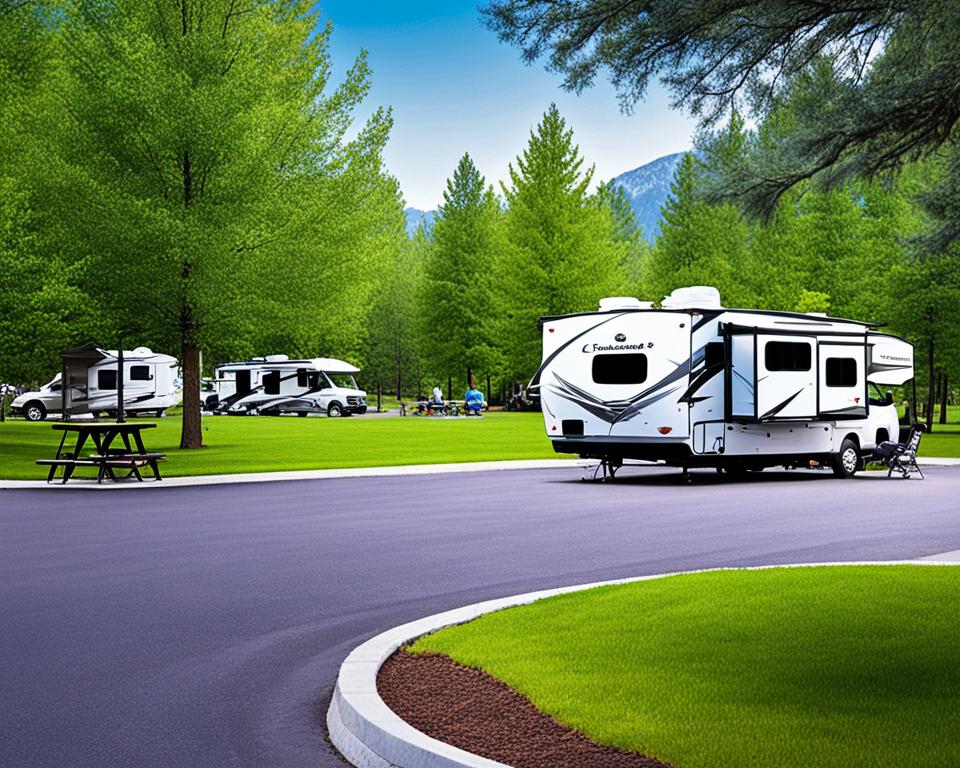
| RV Campsite Rules | RV Campsite Etiquette |
|---|---|
| Follow designated parking regulations | Respect other campers’ privacy and space |
| Adhere to quiet hours | Mind noise levels to avoid disturbance |
| Dispose of waste properly | Minimize use of bright lights during night hours |
| Comply with campground rules and regulations | Familiarize yourself with campground rules |
By following RV campsite rules and observing proper etiquette, you contribute to a positive and enjoyable camping experience for yourself and others. Show respect, consideration, and mindfulness towards your fellow campers, and everyone can make lasting memories in the great outdoors.
Set Up Your RV Campsite Efficiently
Setting up your RV campsite requires some planning and organization. To ensure a smooth and hassle-free setup, follow these essential steps:
1. Allocate Enough Time
Set aside enough time during daylight hours to comfortably set up and break down your RV campsite. This will give you ample time to complete all the necessary tasks without feeling rushed or stressed.
2. Disconnect Towed Vehicles
Prior to setting up your campsite, disconnect any towed vehicles from your RV. This will give you more flexibility and maneuverability during the setup process.
3. Check for Obstacles
Before parking your RV, thoroughly inspect the area for any obstacles or hazards. Remove any rocks, branches, or other debris that could potentially damage your RV or impede your setup process.
4. Park Strategically
When parking your RV, consider the layout of your campsite and plan for easy access to your outdoor seating area or slide-outs. Position your RV in a way that maximizes space and provides the best views and convenient entry and exit points.
5. Level Your RV
Ensuring your RV is level is essential for your comfort and the proper functioning of appliances and systems. Use a leveling tool to determine if your RV is balanced, and make appropriate adjustments by adding leveling blocks or adjusting the leveling jacks.
6. Set Up Your Awning and Outdoor Area
An awning provides shade and protection from the elements, making your outdoor space more enjoyable. Carefully set up your awning, following the manufacturer’s instructions, and consider adding an outdoor rug, chairs, and a table to create a cozy and functional outdoor seating area.
7. Follow an RV Essentials Checklist
Before settling into your campsite, make sure you have all the essential items you’ll need for a comfortable stay. Follow a comprehensive RV essentials checklist that includes items such as bedding, kitchenware, toiletries, tools, and camping gear.
By following these steps and taking the time to properly set up your RV campsite, you can create a welcoming and comfortable space for your camping adventures. Now that your campsite is all set up, it’s time to relax and enjoy the great outdoors!
Dump the Right Way
If you’re planning an RV camping trip and your vehicle has a kitchen, bathroom, or shower, it’s essential to know how to dispose of waste properly to maintain a clean and sanitary RV. Understanding RV waste disposal, finding RV dumping stations, and managing RV holding tanks are crucial aspects of responsible RVing.
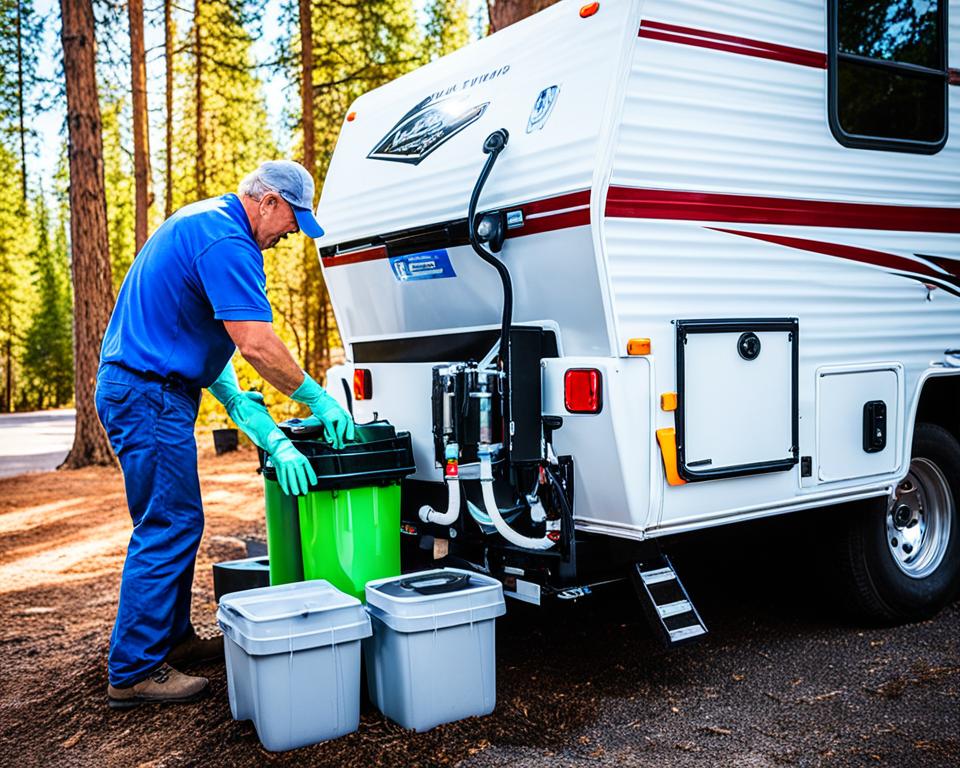
Firstly, familiarize yourself with RV dumping stations where you can empty your waste tanks if you don’t have hookups at your campsite. These stations are specifically designed for the proper disposal of RV waste and are usually found in RV parks, campgrounds, or designated rest areas. Be sure to locate nearby RV dumping stations along your route for convenient waste disposal.
Secondly, it’s important to understand the difference between black tanks and gray tanks. Black tanks hold solid waste from the RV toilet, while gray tanks hold wastewater from the kitchen sink, shower, and bathroom sinks. These tanks should be emptied separately to ensure proper waste management.
When it’s time to empty your RV holding tanks, you have two options: designated dump stations or your campsite’s septic system. If your campground provides full hookups, they likely have a designated area where you can connect your RV’s sewer hose to the septic system. In the absence of hookups, you must locate and utilize a dump station.
Follow proper procedures and guidelines for waste disposal to maintain a clean and sanitary RV. Some key tips to keep in mind include wearing disposable gloves, using a sewer hose to connect your RV to the dump station, and emptying the black tank before the gray tank. Make sure you thoroughly rinse the tanks and hoses after dumping to remove any remaining waste and prevent odors.
Dumping Etiquette
While disposing of your RV waste, it’s important to practice good dumping etiquette to ensure a pleasant experience for yourself and fellow campers. Always follow the rules and regulations of the dump station or campground regarding waste disposal. Be considerate of others and maintain cleanliness by cleaning up any spills or messes and properly securing all connections. Remember, responsible waste disposal is everyone’s responsibility.
Proper Waste Management Tips
To make waste disposal more efficient and convenient during your RV camping trip, here are some additional tips:
- Create a routine for regular tank maintenance, including proper flushing and cleaning.
- Use biodegradable and environmentally-friendly RV toilet paper to minimize clogs and ensure faster breakdown.
- Consider using RV holding tank treatments to control odors and enhance the breakdown of waste.
- Monitor the tank levels regularly to avoid overflows and ensure timely waste disposal.
By following these guidelines and practicing responsible RV waste disposal, you can maintain a clean and comfortable living environment throughout your camping adventure. Remember, proper waste management is not only essential for your own comfort but also for the preservation of natural landscapes and the well-being of fellow campers.
Conclusion
RV camping for beginners can initially appear daunting, but armed with the right knowledge and strategies, it can be an incredibly rewarding and enjoyable experience. By familiarizing yourself with the different types of RVs, understanding your vehicle’s towing capacity, and mapping out a realistic budget, you can set the stage for a successful trip.
To optimize your RV camping adventure, it is crucial to find affordable campgrounds that fit your budget and offer the amenities you desire. Consider joining RV park memberships, exploring free campsites, or taking advantage of discounts and special offers. Additionally, make sure to choose RV campsites that align with your needs, whether it be the availability of hookups or specific amenities.
Once you arrive at your chosen campground, efficiency is key. Set up your campsite with care, ensuring that your RV is leveled and your outdoor area is organized and comfortable. Familiarize yourself with proper waste disposal methods to maintain cleanliness and sanitation during your stay.
Above all, prioritize safety during your RV camping journey. Adhere to campground rules and etiquette, practice safe driving, and be mindful of your surroundings. By following these tips and tricks, you can embark on a successful RV camping adventure and create lasting memories. Happy camping!
FAQ
What are the different types of RVs?
The different types of RVs include motorized RVs such as Class A, Class B, and Class C motorhomes, as well as converted camper vans. Towable RVs include 5th wheel campers, travel trailers, truck campers, teardrop campers, pop-up campers, and toy haulers.
How do I confirm how much my vehicle can tow?
To confirm your vehicle’s towing capacity, refer to the manufacturer’s specifications or consult your vehicle’s owner manual. It is important to consider both the towing capacity of your vehicle and the weight of your gear when selecting an RV.
Where is the best place to park my RV?
It is important to plan your route in advance and identify truck-friendly rest stops where you can find sufficient parking spaces for your RV. Smaller motorhomes and converted vans may have more flexibility in finding parking spaces, but larger RVs require more planning and consideration.
How do I map out a realistic RVing budget?
To map out a realistic RVing budget, consider expenses such as fuel costs, campground fees, rental fees, insurance, amenities, repairs, and standard living expenses. By planning ahead and accounting for all potential costs, you can ensure you have enough funds for a comfortable and enjoyable trip.
How can I find affordable RV campgrounds?
To find affordable RV campgrounds, consider getting RV park memberships like Passport America, Thousand Trails, Good Sam, or Harvest Hosts. You can also explore options such as staying at RV park chains like Sun RV Resorts, parking on BLM public land, or taking advantage of weekly and monthly discounts.
How do I choose the right RV campsite?
When choosing an RV campsite, consider the amenities offered, including electric, water, and septic hookups. If your RV does not have a shower, check if the campsite offers bathrooms and showers. Plan ahead and make campground reservations to secure the right campsite for your needs, especially during high season or when hookups are needed.
What are some RV campsite rules and etiquette?
Follow campground rules, such as quiet hours, parking regulations, and proper waste disposal. Respect other campers’ privacy and space, and be mindful of noise levels and bright lights. By observing RV campsite rules and etiquette, you can create a harmonious camping environment.
How do I set up my RV campsite efficiently?
Allocate enough time during daylight to comfortably set up and break down your site. Disconnect any towed vehicles, check for obstacles, and park your RV for easy access to your outdoor seating area or slide outs. Level your RV if needed and set up an awning, outdoor rug, and seating area. Follow an RV essentials checklist to ensure you have everything you need for a comfortable stay.
How do I dispose of waste properly while RV camping?
Learn about dumping stations where you can empty your waste tanks if you don’t have hookups at your campsite. Understand the difference between black tanks and gray tanks, and empty them at designated dump stations or at your campsite’s septic system. Follow proper procedures and guidelines for waste disposal to maintain a clean and sanitary RV.

